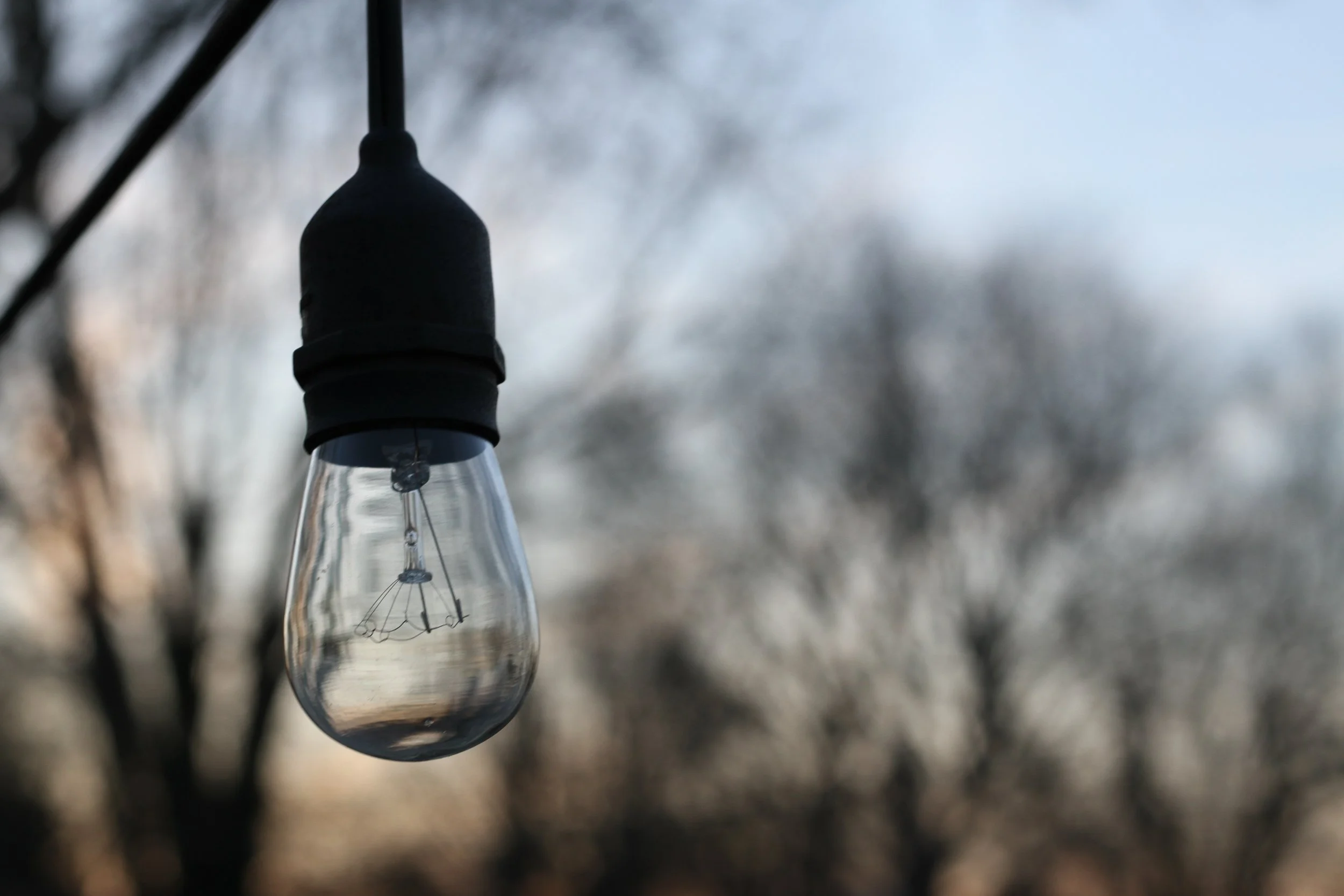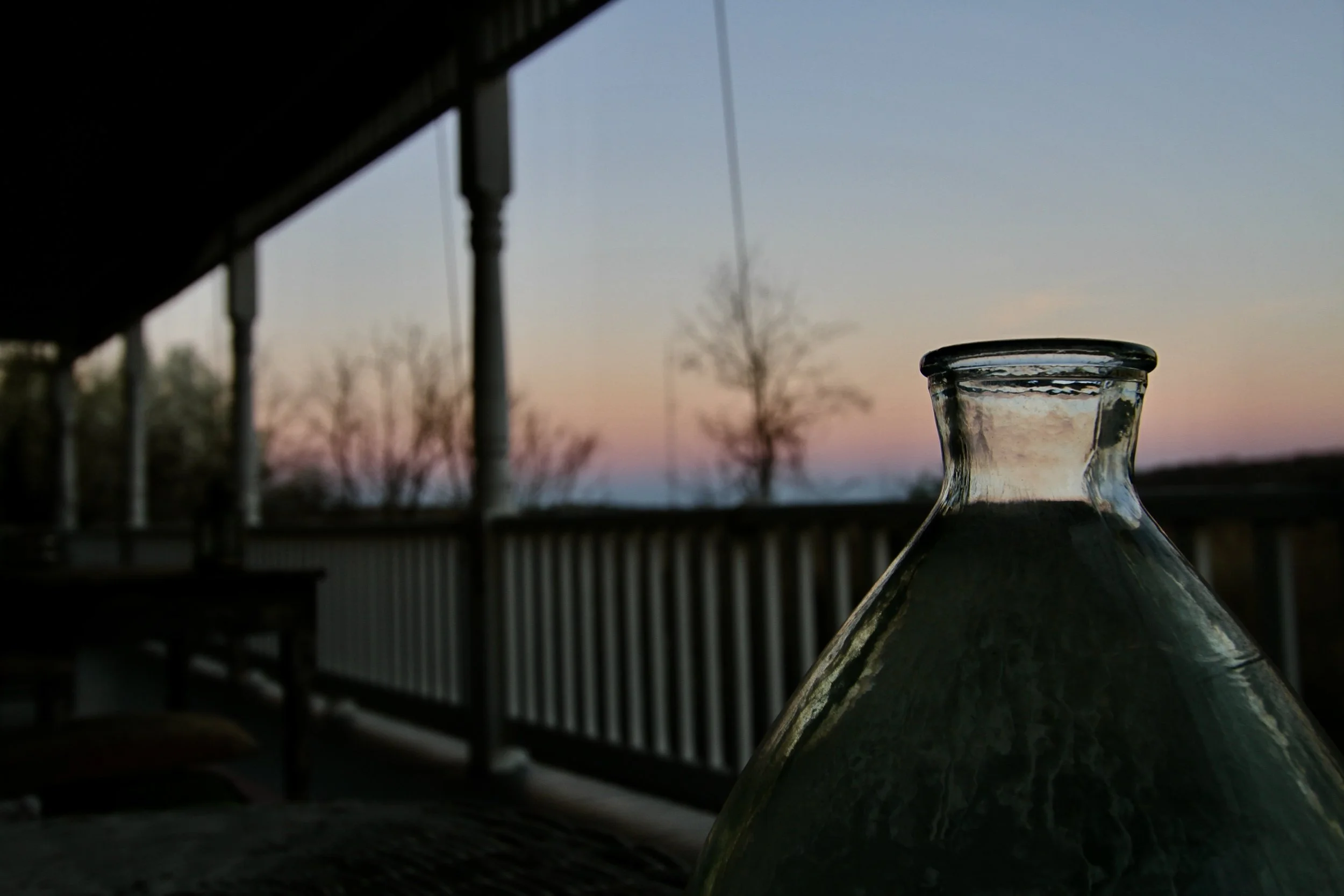My Body Begins Under a Full Moon
by Tara SHEA Burke
Tara Shea Burke, Dusk, Winter, digital photograph, 2023. Courtesy of the artist.
My Body Begins
Under a Full Moon
TARA SHEA BURKE | MAR 2023 | Issue 22
My body begins under a full moon. I begin by filling my mother’s body. My mother’s body was home. She was small. She was beautiful: a spectacle. Until she was filled with me.
My body begins in my father’s heart. My father’s heart was stressed. Taxed. My father’s body avoided taxation. It was hunted because he avoided everything. He left places, lived in basements. My father’s heart was enlarged—the pressure in his blood, high. He hurt and ignored hurt. My father’s heart was a hard-working heart. It thumped under his rib bones, between the thick fascia in his chest and his chest held it.
My body begins in fullness. I am full already, under the full moon, held outside of my full mother’s body in the hands of my father—his heart, full. September 24th, 1983. 11:20 a.m. Front Royal, Virginia. Chart me. I’ll never forget the owl on the porch when we left for the hospital that night, she tells me. It looked right at me.
My body begins in my mother’s body. My body comes out and is held by my father. My mother already has a camera turned toward me. I am hungry and wailing, a fat moon—mesmerized by my father: his gaze and all his hair. I look at him and he looks back. I am 8 pounds 11 ounces. I am thick: thick black hair and thick blue eyes and I have filled my mother and now I will fill my father’s heart. My father holds me in his heart. I am the first wet evidence of his second try at family. His heart is stressed. He is thirsty. I am hungry. His ventricles and atrium and all the folded-in layers work very hard to keep what he saw as a child at bay. He is barely twenty-nine years old. My body begins by making my mother’s body big for the first time. She never let me forget it. My body begins by filling my father’s heart. What goes in and feeds his desire and what goes out and kills it.
Did you know a human heart is a spiral? If you take a cadaver heart, a donor body—death as a donation to the living—you can slowly tinker at the ways muscle and sinew and fascia connect—a heart can be unraveled like canned dough rolls—triangles you roll out and press into each other, or roll back in: little spiraled American pastries. A heart can be opened and tenderized, pounded out like tough meat, then curled back in on itself. A spiral. The heart is not a fist. It’s not a pump, really. It circulates by squeezing in and releasing out. The heart is layers: they fold in, curl tightly at the core, relating inside to everything—lungs, tissue, bone. The heart can be undone, but only when there’s nothing left to be done. She spirals, squeezes and relaxes, circulates through an artful compression. Like a washcloth twisted until it is no longer sopping. A normal amount of stress keeps things moving.
My body begins and in the days after I become a spectacle. A girl baby with a lens turned upon her body. I am a child wide-eyed in flashes of light. In flashes of light, I hear my name called over and over, Tara Shea. An infant can’t quite see but she can be seen. She can be seen but she needs touch. Before I can see or walk, I see a face or a camera and perform. Later, I dance and clap. At the body’s beginning, I am an infant held toward the right angle of the camera. I am not pulled in and held. I am raised up to the right light: something to print and refer to later.
I am spectacle for my parents and all their early love—wild on fire between them. Too hot. Little wet, fat me: smiling and full and suddenly, the sole site for mom’s attention—what’s between them seeps into me, and spirals out. In and out. Our hungers: the ways we eat and fill with drink. The things my parents thought they wanted slipping between the low mountain light: sun sets earlier behind all those trees. An infant directs your movements and stillness and my mother directs me. I can’t remember this, of course. I had eyes and hair and a primal urge to make them happy, to keep them close.
I remember my mother’s voice and the way she pressed us to laugh together. I remember songs in the car. Books, too, but that’s later. Time slips between the flash. I remember my father’s hands. I remember being told, always, to Pay attention, Tara. Slow down. I remember my body held at a distance. Looked at, as I looked for something to hold. Told to stop. Smile. Be happy. Pay attention. Be good.
I don’t remember their touch, and I crave touch now more than any drug I’ve taken and dreamed of, wanting more. The ecstasy is here, I thought, the first time I slipped it under my tongue—my body felt like waves under light all night. A sensation like god, like something I understood beyond words or sound. Something deep in my body: yes, this is the life I want. One where thirst and hunger thrust against one another in undulating waves of sensation. I still remember how it woke the skin and tissue of my body right the fuck up. One day I was a disembodied, sick teenager popping ephedra and thinking, thinking, and then—ecstasy. Pleasure. Permission for pleasure. An electricity that told me my physicality was the whole point.
I was born and my body became a body and mom and dad’s bodies were my first craving. I needed and they were there but never quite there. A happy-limbed mammalian infant in a little yellow plastic baby carrier, on display. Kept on the couch to entertain, to be entertained. You were so good left alone, mom tells me. You didn’t really need much. Such an easy baby.
I was born to be left alone. I was born to be held at a distance and seen. Capable. Easy. I responded when I was called. I posed. Later, I came when I was told to, when my name was yelled. I looked when called. I smiled to make my mother’s face smile. I smiled to make my father’s face possible. I cheered. Ra ra ra.
In my favorite photo of my father, he is holding my baby body up and away, under a warm yellow light. My mother, behind the camera, directs. His hair: brown and shag-curly, covering his head and framing his face, begging rest at his shoulders. A son of Irish immigrants—both sides. Islandeady, County Mayo. A body from famine. Coffin ships. Port to Scranton, Pennsylvania to coal mines to bottles into hands that grip fists of their wives hair. Not my father—he would never, but the grip lived in him, depressed him. He, too, a heavy spectacle. Quiet and full of a rage I could feel. Thick curls, thick thirst. Mustache, beard. Eyes filled with a longing I feel through my own.
He died the year I came back to Virginia, face down in the dirt, working off the books. And before the grief settled it became the year of the virus. I hold this photo of him holding me as if it will bring him back. My body began, and then what? My body in his hands, held up. The warm colors: brown and yellow and my body in a cream dress with peasant ruffles—little doily holes on curved baby collars—held up and away. His eyes on me, as if in shock to have a new body. A baby girl. A fresh start. A lifetime of famine in his body, his blood, and more to come.
My mother directs the camera: after I am a body outside of her body, she is a body behind the lens. She tells. Captures. We obey. We want her, us, to be happy.
Tara Shea Burke, Porches, digital photograph, 2023. Courtesy of the artist.
Tara Shea Burke is a queer poet from the Blue Ridge Mountains of Virginia, and the author of Animal Like Any Other. She teaches writing and creative practices at VCU and the Visual Arts Center of Richmond. She's been a literary editor and contest judge, has served as a board member and grants coordinator, is trained in trauma-informed, accessible movement and workshop facilitation, and hustled in restaurants for 20 years. Her work has been published widely, most recently in Southern Humanities Review and Queer Nature, edited by Michael Walsh and Autumn House Press.

